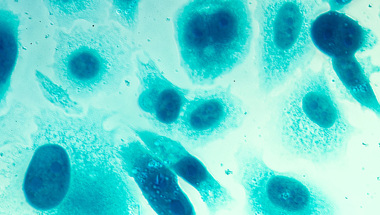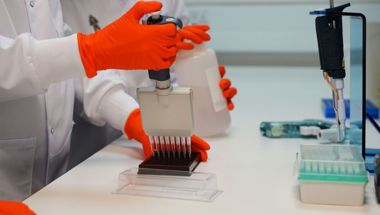
Investigating a new drug that can tell the immune system to attack and destroy prostate cancer

Grant information
Reference: RIA24-ST2-004
Lead researchers: Dr Helen Pearson and Professor Girish Patel
Institution: Cardiff University
Award: £356,361
What you need to know
- Scientists in Cardiff have developed a new drug that helps the immune system wake up and attack prostate cancer.
- This drug blocks a signal called CD200, which normally tells the immune system to ignore the cancer, letting it grow and spread.
- The team will test how well the drug works in different types of prostate cancer, aiming to find out who it could help most and how to use it alongside current treatments.
Why are we funding this research?
Although treatments for prostate cancer have improved rapidly in the last few years, when the disease spreads and stops responding to standard treatments, men are left with few options. What’s more, immunotherapy, which has revolutionised the way we treat many other cancers, doesn’t usually work for prostate cancer.
This research is trying to tackle these problems. The team in Cardiff has developed a new drug that targets a signal called CD200, which acts like a ‘do not attack' sign to the immune system (which is meant to defend the body from diseases like cancer). In prostate cancer, CD200 helps the disease hide and grow. By blocking this signal, the drug helps the immune system recognise and fight the cancer.
This drug has already shown promise in other cancers, and now the researchers want to find out which types and stages of prostate cancer it could help. They’ll also explore how it works alongside existing treatments, and whether it could help men whose cancer has spread or stopped responding to therapy.
This research could lead to a brand-new treatment option – one that helps the body target prostate cancer more effectively.
What will the researchers do?
To find out if the new drug could help treat prostate cancer, the researchers will run a series of lab experiments using specially bred mice and human cancer cells that closely mimic different types and stages of prostate cancer.
Some will represent cancer that’s still in the prostate but likely to spread, while others will mimic cancer that’s already spread or stopped responding to hormone therapy.
The researchers will test the drug against these examples, both on its own and alongside standard treatments like hormone therapy, to see how well it works. They’ll look at whether the drug slows down cancer growth, stops it spreading, or makes other treatments more effective. They’ll also study how the drug affects the immune system’s ability to recognise and attack the cancer.
The researchers will also study how CD200, the signal that helps cancer hide, helps prostate cancer grow and spread, and whether blocking it can slow things down. They’ll also look for clues in cancer cells and blood that could help predict which men are most likely to benefit from this treatment.
All of this will help the team design a future clinical trial, where the drug can be tested in men with prostate cancer for the first time.
This innovative research will deepen our understanding of prostate cancer and accelerate the development of a new treatment that aims to boost the immune system to attack and kill cancer cells – improving outcomes and quality of life for men with this disease. We’d like to thank all the patients involved in shaping our project, and everyone who has raised money for Prostate Cancer UK to fund it. This work wouldn't be possible without you.
How will this benefit men?
This research could lead to a new way of treating prostate cancer, especially for men whose cancer has spread or stopped responding to current treatments. Right now, advanced cancer is difficult to manage because the cancer finds ways to hide from the immune system.
If successful, this drug could offer hope to men with aggressive or hard-to-treat prostate cancer. It might also help standard treatments, like hormone therapy, work better. The researchers are aiming to find out which men are most likely to benefit, so in future men’s treatment can be better tailored to them.
Ultimately, this work could lead to a brand-new treatment option – one that helps the body fight back more effectively and improves both survival and quality of life for men with prostate cancer.





